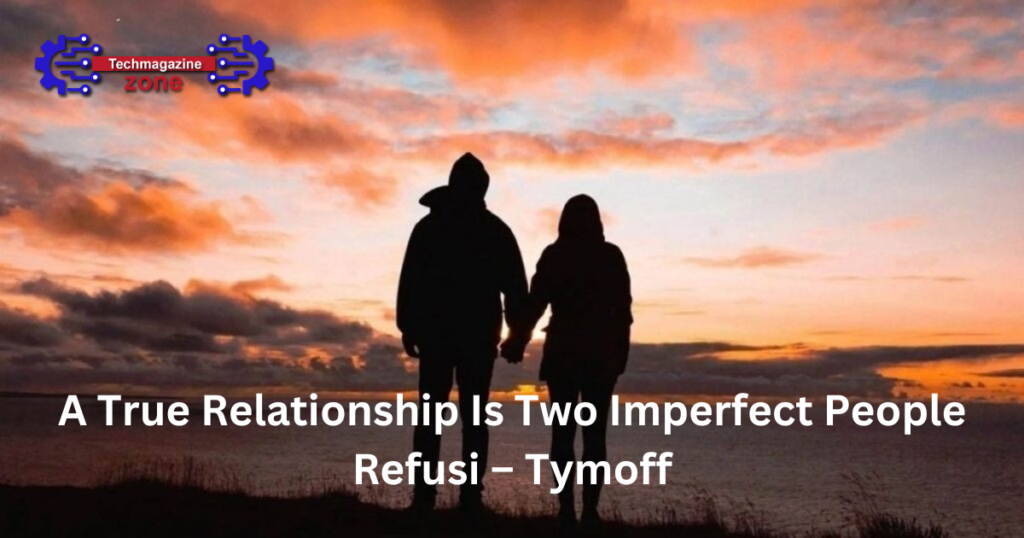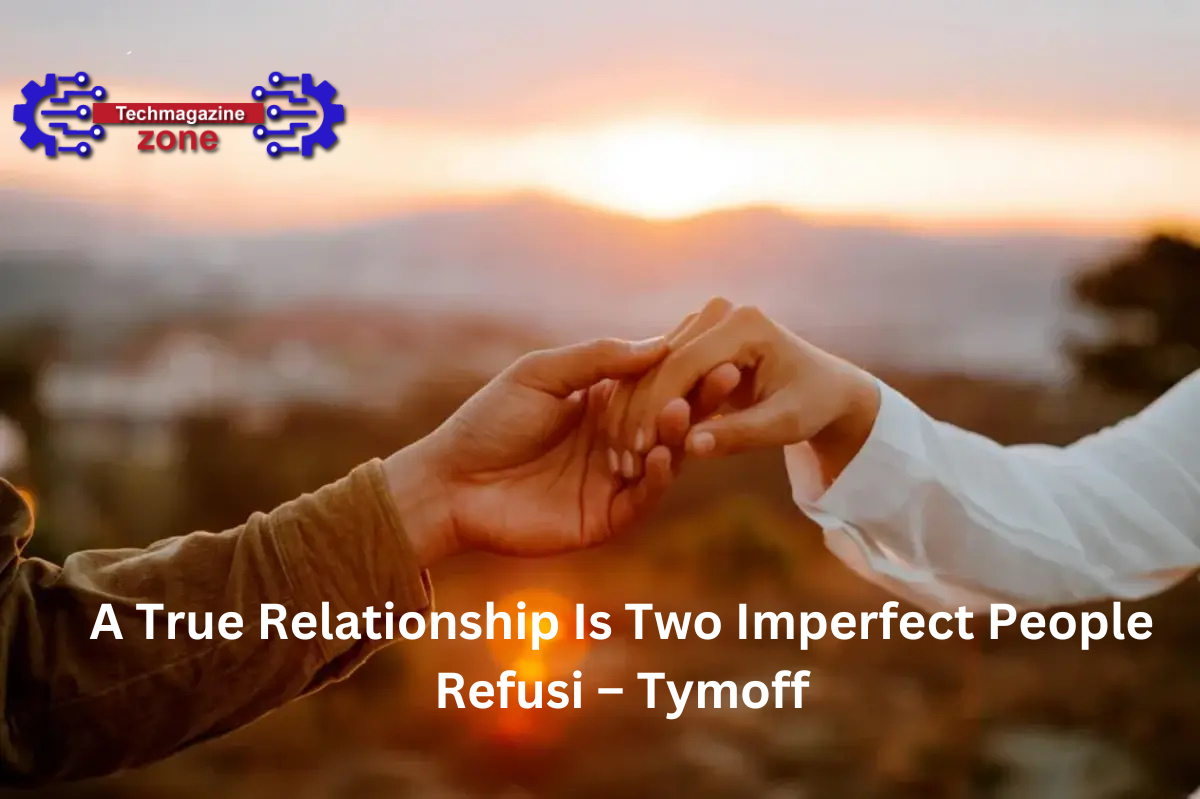The Meaning Behind “A True Relationship Is Two Imperfect People Refusing to Give Up”
At the heart of Tymoff’s quote is the notion that no one is perfect. When two individuals come together, they bring their own sets of flaws, insecurities, and challenges. A true relationship is not about finding someone flawless but rather about accepting and loving them despite their imperfections. Both partners understand that they are fallible and make mistakes. Instead of walking away at the first sign of trouble, they make the conscious decision to work through their problems together.
This mindset counters the common myth that a relationship should be effortless and free of conflict. The reality is that conflict is a natural part of any human interaction. Whether it is about differing opinions, misunderstandings, or mistakes, problems will arise. The key to a successful partnership is the refusal to give up during these difficult times. True love is strengthened by overcoming obstacles, not by the absence of them.
Embracing Imperfection in Relationships
In today’s world, social media often presents an image of flawless relationships, where everything seems perfect, and partners never argue or experience hardship. However, these portrayals are far from reality. All relationships involve moments of doubt, disagreement, and disappointment. Understanding and embracing imperfection is crucial to maintaining a healthy, long-lasting bond.
When individuals expect perfection from their partner, they set themselves up for failure. No one can meet impossible standards, and the pressure to be flawless can strain the relationship. A true connection thrives on vulnerability and honesty, where partners feel safe to be themselves—flaws and all. By accepting imperfection, couples can focus on the strengths of their relationship and find joy in each other’s company without the unrealistic expectation of constant harmony.
The Importance of Communication in Overcoming Challenges
One of the most critical components of a true relationship is communication. When two imperfect people refuse to give up, open dialogue becomes their most valuable tool. Misunderstandings are inevitable, but they can be resolved through honest and compassionate communication.
Effective communication involves active listening, where both partners take the time to truly understand each other’s perspectives without jumping to conclusions. It also means expressing one’s thoughts and emotions clearly, without fear of judgment. When partners communicate openly, they create a safe space for vulnerability, which strengthens trust and intimacy.
Moreover, communication helps in addressing conflicts before they escalate into larger issues. Instead of harboring resentment or sweeping problems under the rug, partners can openly discuss their concerns and work toward a solution. By committing to communication, two imperfect people can navigate the complexities of their relationship and come out stronger on the other side.
Forgiveness: A Pillar of a True Relationship
Forgiveness plays a vital role in any relationship. Since no one is perfect, mistakes are bound to happen. Whether it’s a misunderstanding, a lapse in judgment, or a more serious issue, partners will occasionally hurt each other. What matters is how they handle these moments. A true relationship is built on the willingness to forgive and move forward.
Forgiveness does not mean forgetting or ignoring the hurt, but rather choosing to release the anger and resentment that can damage the relationship. It is about understanding that people make mistakes and that those mistakes do not define them. In a true relationship, both partners are willing to forgive because they prioritize their connection over holding onto grudges.
This mutual forgiveness allows partners to learn from their mistakes and grow together. It strengthens their bond by showing that, despite their imperfections, they are committed to making the relationship work. Through forgiveness, couples can rebuild trust and continue building a future together.
The Role of Patience and Compromise
Another critical aspect of a true relationship between two imperfect people is patience. Love is not a sprint but a marathon. It requires time, effort, and understanding. When challenges arise, it’s easy to feel frustrated or disillusioned. However, patience allows partners to navigate these challenges with grace and empathy.
Compromise is equally important. A true relationship involves finding a middle ground, where both partners feel valued and heard. Instead of rigidly holding onto their positions, they are willing to adjust and meet each other halfway. Compromise ensures that both partners’ needs are respected, fostering a sense of balance and equality in the relationship.
Both patience and compromise are signs of maturity. They show that two imperfect people can come together, despite their differences, to build a life based on mutual respect and love. It’s this willingness to accommodate each other’s flaws and needs that creates a lasting, fulfilling relationship.

Commitment: The Backbone of a True Relationship
At the core of Tymoff’s quote is the idea of commitment. When two imperfect people refuse to give up, they are committing to each other, regardless of the challenges they face. Commitment goes beyond words; it is demonstrated through actions, such as showing up for one another, supporting each other during tough times, and working through conflicts together.
True commitment is not conditional. It does not waver in the face of difficulties or seek perfection. Instead, it is a steadfast promise to stand by one another, even when the road is rocky. This unwavering dedication is what transforms a relationship from fleeting to lifelong.
In today’s fast-paced world, commitment can sometimes feel daunting. Many people are quick to leave when things become difficult, believing that they can find a more “perfect” partner elsewhere. However, true love is not about finding someone perfect—it is about building something meaningful with someone despite their imperfections. Commitment ensures that two imperfect people can weather the storms of life together and come out stronger.
Conclusion: The Beauty of Imperfect Relationships
In conclusion, Tymoff’s quote, “a true relationship is two imperfect people refusing to give up,” offers profound wisdom about the nature of love and partnership. No relationship is without flaws, but it is the commitment to working through those imperfections that makes a relationship truly special. Embracing each other’s flaws, practicing forgiveness, maintaining open communication, and committing to patience and compromise are the keys to a lasting and fulfilling relationship.
A true relationship is not about avoiding conflict but about growing together through it. It is not about expecting perfection but about accepting and loving each other’s imperfections. When two imperfect people refuse to give up, they create a bond that is strong, resilient, and filled with love that stands the test of time.
In the end, the beauty of a relationship lies not in its perfection but in its authenticity. Two imperfect people, willing to work through their challenges and grow together, will find that their love becomes deeper, more meaningful, and more rewarding with each passing day.
